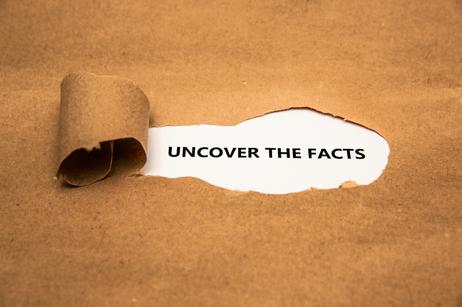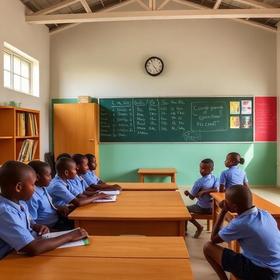Myths, urban legends, and just plain misinformation abound concerning private schools. That doesn't help parents who are thinking about sending their children to private school. So, let's shed some light on the facts you may not have known about private schools.
1. Private schools existed before public schools.
That's right! Back in colonial times, education varied from colony to colony. The common thread that I was able to find is that education was stratified along class lines. Children from poor families were taught skills so that they could do a manual job and survive. Children from the upper classes received a basic education in literature, mathematics, and religion. If their families could afford it, the boys might be sent off to boarding school in England. This stratification of education persisted until the late 19th century.
This video looks at the beginnings of Colonial education: dame schools, Latin grammar schools, church schools, and pauper schools.
In those times upper-class girls were given enough education to be able to run a household. But amazingly enough colonial families did have daycare. They could leave their children at Dame schools, so-called because a dame or lady would teach their children the basics such as their letters and some prayers while she tended to her household chores.
2. Private schools are set up in three main ways.
Many parents assume that all private schools are set up in the same way. There are a great many similarities and structures in common across the three principal ways most private schools are set up. And there are differences too. The most common kind of private schools are the stand-alone not-for-profit institutions. They operate under Section 501 (c) (3) of the IRS code and are tax-exempt. There are also for-profit schools which are not tax-exempt. Another variation of the tax-exempt schools are the schools which operate under the umbrella of a church or diocese which is tax-exempt.
3. Some private schools are free.
We constantly hear about how expensive a private school education is. And, indeed, many schools are expensive. Yet there are actually a handful of private schools which are free. That's right, everything is paid for, thanks to the generosity of the visionary founders of these schools.
In this video, we see how Princess Bernice Pauahi Bishop was a woman of intelligence, compassion and foresight who understood that her kuleana as a Hawaiian ali‘i was to serve her people.
What about the schools which are not free? Most of them offer very generous financial aid programs. Several private schools even go so far as to offer a free education to applicants who meet the admission requirement but come from families with earnings below a threshold of $75,000, for example.
4. Hundreds of Roman Catholic private schools are operated by religious orders.
The Roman Catholic church has historically made education a centerpiece of its mission. According to the Department of Education's Private School Universe Survey from 2011-2012, approximately 6,783 private schools are affiliated with the Roman Catholic church. That number includes thousands of parochial K-12 schools and diocesan high schools which are funded at the local and diocesan level. It also includes hundreds of high schools that are operated as stand-alone or independently-funded entities by religious orders such as the Jesuits, the Benedictines, the Marists, the Dominicans, to name just a few of the more than twenty Roman Catholic teaching orders.
5. Private schools exist in just about every country of the world.
What has always fascinated me about finding private schools flourishing all over the globe is that they exist for the same reasons as they do back here in the United States. Parents everywhere want a better future for their children. To ensure that better future they send their children to private schools where the discipline is tighter and the academics are well-taught and comprehensive. Those reasons sound familiar because those are the reasons you and I send our children to private school.
6. Private schools value the partnership of parent, child, and school.
I have read many stories over the years about students being left to fend for themselves when it comes to their school work. In my opinion, this is one of the biggest advantages of private school education. Your child's education is not the school's responsibility. It is a partnership. There are three partners in the process: the school, your child and you. None of the partners may abrogate their responsibilities. As a result, your child will progress to the best of her ability, all things being equal, of course. Built into this objective are constant supervision and high expectations. Small class sizes ensure that your child will not be able to hide. She will not be a number. Her individual needs will be met expediently and professionally.
7. Private schools try to develop the whole child.
I know that many people think that private schools are all about academics. But there really is more to a private school education than academics. Private schools understand that your child is an individual. They seek to develop their students academically to the best of their ability recognizing that each student is unique and blessed with gifts. They also understand that a healthy body is essential to good learning. So private schools require their students to participate in sports and other athletic activities. They further encourage teamwork and respect for others through participation in a wide range of extracurricular activities.
This video offers a look at Escuela del Sol, a Montessori school in Albuquerque, New Mexico.
As St. Timothy's School in Stevenson, Maryland puts it so beautifully: "Our goal is to prepare students for lives of meaning and consequence. We provide a comprehensive and flexible academic program in a supportive, richly resourced, and beautiful setting."
8. Private schools do not have students' rights per se.
Many parents assume that their children have constitutional rights when they send them to private school. Consequently, they are shocked to discover that their child has been disciplined for offenses of the school's Code of Conduct. "My child has rights!" is your first reaction. Read the contract you signed with the school. Your child's rights are spelled out in legal detail under the terms of that contract. Constitutional rights do not apply. I point this out because some parents have the idea that they can throw their weight around or buy their way out of tough situations. You can try that, though I do not recommend that approach. If the school expels your child for substance abuse or some other major offense, call your educational consultant immediately and find a new school for your child.
9. Several private schools teach their students in foreign languages.
Schools that teach their students in French, German or Chinese cater to the requirements of an expatriate community for the most part. They tend to be located in major urban areas that have major American offices of overseas institutions. The employees of these institutions transfer in from overseas with their families and plan to return home in a few years. These international schools fill a need and have a special purpose.
10. Private schools are not just for rich kids.
I can't remember how many times I have made this statement over the years. But private schools are not just for rich kids. Perhaps they were back in the 1950s. Not any more. Diversity and social awareness are major watchwords in private schools in the 21st century. And that is a good thing.
Good luck with investigating private schools. There is a school out there that will meet your needs and requirements.
Questions? Contact us on Facebook @privateschoolreview













